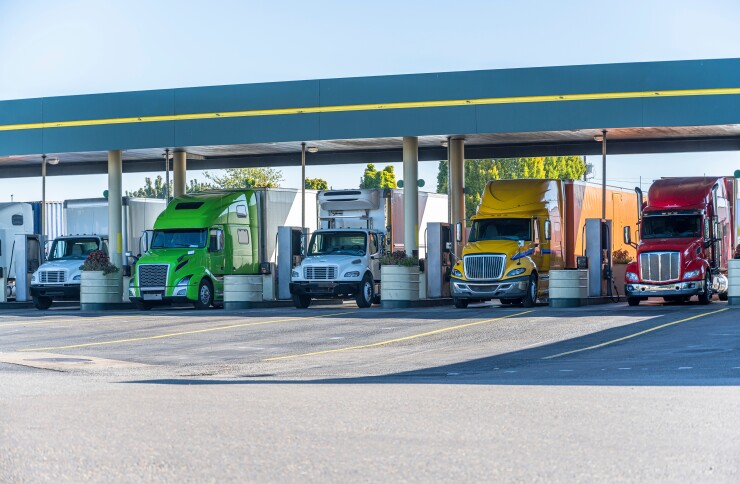
Relay Payments, a four-year-old fintech, is attempting to disrupt the long-running fleet card industry by pushing a completely mobile and contactless payment system for truckers and fleets.
It has some hefty competition. The U.S. fleet card industry, which drives more than $90 billion in annual spending, is a field dominated by private-label fuel card networks including
But the time may be right for disruption. A recent
"Relay Payments is bringing the same type of fully digital payment experience you see with Apple Pay and other digital wallets to the fleet, freight and logistics space," said Ryan Droege, Relay Payments' co-founder and CEO, who has served in various payments firms and previously co-founded
On Wednesday, Relay announced a partnership with Pilot Company, North America's largest operator of travel plazas that provide fuel and other services to truck drivers and fleets, including 800 outlets under the Pilot Flying J brand. The retailer's pumps will now accept Relay Payments' mobile technology, which is used by 300,000 drivers and 90,000 fleet operators, accounting for about 10% of available fleets, Droege said.
Relay has also developed digital tools to streamline payments for lumpers who load and unload freight. Earlier this year, Schneider, which manages $3 billion in third-party freight via shippers, carriers, adopted Relay Payments for its fleet, including 12,000 drivers. Coyote Logistics, J.B. Hunt, Old Dominion Freight Line are also using Relay Payments' services
Atlanta-based Relay isn't the only contactless fleet card option; some of the biggest fleet card networks have added mobile payments capabilities in recent years. But Relay's digital-only approach delivers a more seamless and secure way of managing fuel and related expenses without the challenges or fraud risk of managing physical cards, according to Droege.
"Cards are expensive to distribute and they can get lost, and fleets are frequently required to freeze a truck or fleet driver's card in the middle of their trip, creating tremendous inconvenience," Droege said.
Connecting fleet managers with drivers through mobile phones, Relay Payments supports sophisticated processes for tracking spending, fees and optimizing fuel prices, with the core capabilities most fleet cards provide, including the ability to instantly manage controls over which fuel types, locations and purchases a fleet program allows, he said.
"The EMV migration got a late start with fleets and it may take a decade to be fully complete, so we're leapfrogging completely over the card phase," Droege said. Fleet cards didn't officially begin to migrate to the more secure Visa and Mastercard EMV chip standard
Relay hopes to gain traction from publicity surrounding diesel fuel thefts at stations where thieves have intercepted card data. In some cases, criminals are collaborating across states using stolen cards or compromised fleet-card data to steal hundreds of thousands of gallons of diesel, reselling it at lower-than-market prices.
In
"One way or another, cards create holes in fleet card security," Droege said.
Relay Payments isn't the only upstart attempting to displace bigger, older players in the fleet card industry, and it's not going to be an easy task, due to the entrenched relationships in the fleet card industry, according to one analyst.
"We don't see fleet cards going away anytime soon, despite the rising interest in digital payment methods," said Ben Danner, a senior analyst with Javelin Strategy & Research.
Most fleet cards began issuing EMV chip-enabled cards in 2020, and several existing large fleet card programs offer contactless and mobile payments. One example is Portland, Maine-based WEX's
"More nimble fintechs do have room to innovate in the fleet card arena," Danner said, noting that technology in the fleet card industry — and business-to-business payments in general — tend to lag behind the pace of development on the consumer side.
In recent years, upstarts including Coast, AtoB and Edenred have launched open-loop fleet cards on Visa's network, building on Visa's 2021 initiative to adopt new fleet card rules and program enhancements, Danner said.
For all of these companies, taking on legacy providers in the fleet card industry is a daunting task, according to Danner. "The existing players have vast networks of fuel merchants with legacy partnerships giving them the ability to offer competitive pricing and rewards," he said.
Droege predicts that as digital payments technology continues to take hold, more fleets that are still operating with checks and even cash will consider payments disruptors who can offer competitive fuel prices with a simple, secure technology implementation.
"We're connecting shippers, freight brokers and the merchants directly on a new network to settle and clear these transactions electronically and fuel will be one of our biggest growth areas this year" Droege said, noting that the Pilot partnership increases Relay's reach by 200% to reach 1,200 U.S. fuel locations serving the fleet and trucking industries.






